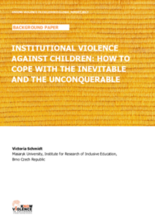Abstract
This paper, produced for the Know Violence global learning initiative, looks at the violence children experience in closed institutions in the Central Asian countries, specifically the former Soviet republics: Kazakhstan, Kyrgyzstan, Tajikistan and Uzbekistan. In these countries, despite considerable efforts to develop alternatives, the number of children placed in various residential care units remains extremely high. In-depth interviews with local experts and focus group discussions in these four countries were the main method of gathering data as well as desk research focussing on statistical reports, analysis of residential care reports produced by the Ombudsmen, and various publications from the projects, which were involved in monitoring closed institutions and preventing violence against children in them. In our analysis we have focused primarily on the resonance between the Soviet legacy and the very visible pressure from international bodies for the countries of the Global South to adopt the models and approaches of the Global North. We reviewed current approaches to institutional violence in order to draw up a methodology to connect policy-making, legal reforms and assistance (both professional and quasi-professional) around children and their rights.

